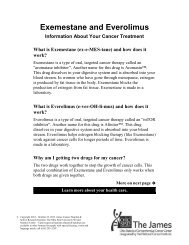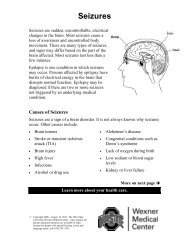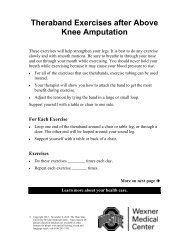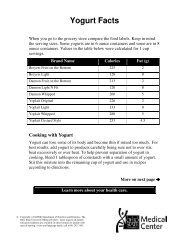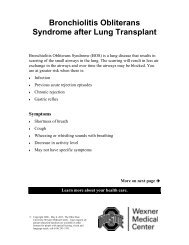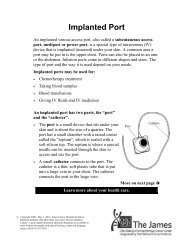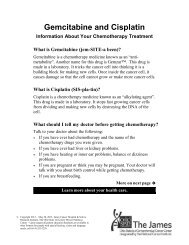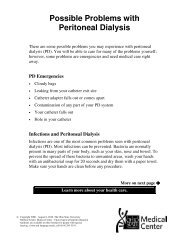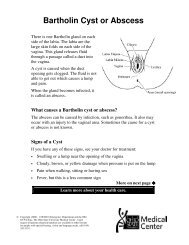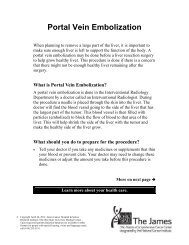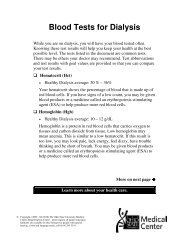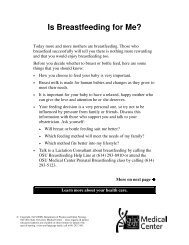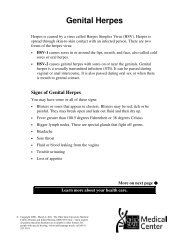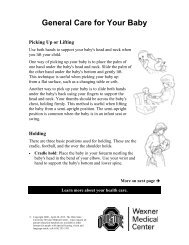CVD: Cisplatin, Vinblastine, and Dacarbazine - Patient Education ...
CVD: Cisplatin, Vinblastine, and Dacarbazine - Patient Education ...
CVD: Cisplatin, Vinblastine, and Dacarbazine - Patient Education ...
Create successful ePaper yourself
Turn your PDF publications into a flip-book with our unique Google optimized e-Paper software.
<strong>CVD</strong>: <strong>Cisplatin</strong>, <strong>Vinblastine</strong>, <strong>and</strong><br />
<strong>Dacarbazine</strong><br />
Information About Your Chemotherapy Treatment<br />
What is <strong>CVD</strong>?<br />
It is the short name for the drugs used in this chemotherapy treatment.<br />
The three drugs you will receive during this treatment are <strong>Cisplatin</strong><br />
(“C”), <strong>Vinblastine</strong> (“V”), <strong>and</strong> <strong>Dacarbazine</strong> (DTIC-DomeTM or “D”).<br />
This chemotherapy will be given daily for 5 days.<br />
What is <strong>Cisplatin</strong> (SIS-pla-tin) <strong>and</strong> how does it work?<br />
<strong>Cisplatin</strong> is a chemotherapy drug known as an “alkylating agent.”<br />
<strong>Cisplatin</strong> works to stop fast growing cancer cells from dividing <strong>and</strong><br />
making new cells. This will be given daily on days 2 through 5.<br />
What is <strong>Vinblastine</strong> (vin-BLAS-teen) <strong>and</strong> how does it work?<br />
<strong>Vinblastine</strong> is a chemotherapy drug known as an “anti-microtubule<br />
inhibitor.” This drug fights cancer cells by stopping fast growing<br />
cancer cells from dividing <strong>and</strong> making new cancer cells. This drug<br />
will be given daily on days 1 through 5.<br />
What is <strong>Dacarbazine</strong> (da-KAR-ba-zeen) <strong>and</strong> how does it work?<br />
<strong>Dacarbazine</strong> is a chemotherapy drug known as an “alkylating agent.”<br />
<strong>Dacarbazine</strong> works to stop fast growing cancer cells from dividing<br />
<strong>and</strong> making new cells. This drug will be given on the first day.<br />
© Copyright 2012 - May 24, 2013. James Cancer Hospital & Solove<br />
Research Institute, The Ohio State University Wexner Medical<br />
Center - Upon request all patient education h<strong>and</strong>outs are available in<br />
other formats for people with special hearing, vision <strong>and</strong> language<br />
needs, call (614) 293-3259.<br />
Learn more about your health care.<br />
More on next page
Page 2<br />
Why am I getting three chemotherapy drugs for my cancer?<br />
These drugs work to stop fast growing cancer cells from dividing <strong>and</strong><br />
making new cells, but they attack the cancer cells differently. Giving<br />
the three drugs together makes the treatment more effective.<br />
What should I tell my doctor before getting chemotherapy?<br />
Talk to your doctor about the following:<br />
If you have ever had chemotherapy <strong>and</strong> the name of the<br />
chemotherapy drugs you were given.<br />
If you are pregnant or think you may become pregnant.<br />
If you are breastfeeding.<br />
If you have been told that you need to start a new medicine.<br />
The medicines/pills you are taking including:<br />
Medicines prescribed by any of your doctors<br />
Herbs<br />
Vitamins<br />
Over-the-counter medicines<br />
If you have ever had heart, liver, or kidney problems.<br />
How does my doctor decide my chemotherapy dose?<br />
To determine your treatment dose, your doctor will review the<br />
following: your height, your weight, your medicines, how well your<br />
heart, liver <strong>and</strong> kidneys are working, <strong>and</strong> any health problems you<br />
have.<br />
The dose you receive is based on your height <strong>and</strong> weight <strong>and</strong> may be<br />
adjusted if you have had side effects from any other medicines used to<br />
treat your cancer.<br />
You will receive treatment daily for five days, every three weeks.<br />
Your dose may be reduced or delayed if you have side effects.
How will my treatment be given?<br />
One hour before your chemotherapy, you will be given several<br />
medicines to prevent nausea or vomiting.<br />
Page 3<br />
<strong>Vinblastine</strong> is given directly into your blood stream through a tube<br />
(IV) placed in your arm or chest. Your nurse will stay with you<br />
while the <strong>Vinblastine</strong> is given. This treatment will take about 10<br />
minutes. Tell your nurse right away if you feel any pain,<br />
stinging, or burning while getting this drug.<br />
<strong>Dacarbazine</strong> is given directly into your blood stream through a<br />
tube (IV) placed in your arm or chest. <strong>Dacarbazine</strong> comes in a bag<br />
with tubing attached. The nurse will connect the tubing to a pump.<br />
This medicine will be given over 45 minutes.<br />
<strong>Cisplatin</strong> is given directly into your blood stream through a tube<br />
(IV) placed in your arm or chest. <strong>Cisplatin</strong> comes in a bag with<br />
tubing attached. The nurse will connect the tubing to a pump. This<br />
medicine will be given over one hour.<br />
Day 1: You will receive <strong>Vinblastine</strong> followed by <strong>Dacarbazine</strong>. This is<br />
the only day you will receive <strong>Dacarbazine</strong>.<br />
Day 2-5: You will receive <strong>Vinblastine</strong> followed by <strong>Cisplatin</strong>.<br />
Your entire visit, including your doctor’s appointment <strong>and</strong> your<br />
treatment will take about 6 hours.<br />
What are the side effects of this treatment?<br />
Every person responds differently to treatment. Some of the more<br />
common side effects of this treatment are:<br />
Nausea <strong>and</strong> vomiting<br />
Damage to the kidneys<br />
• Decrease in the amount of electrolytes in your bloodstream (your<br />
doctor will check the amount of electrolytes in your blood before<br />
each treatment)<br />
Local pain, burning feeling <strong>and</strong> irritation (sore, tender <strong>and</strong> itchy) at<br />
the needle site while your treatment is being given
Page 4<br />
Low blood counts. Your white <strong>and</strong> red blood cells <strong>and</strong> platelets<br />
may be lower while receiving this treatment. This may increase<br />
your risk for infection, anemia (low red blood cell count) <strong>and</strong><br />
bleeding/bruising.<br />
Poor appetite<br />
Increase in enzymes made by your liver (your doctor will check<br />
your blood to see how your liver is working)<br />
Fatigue <strong>and</strong> weakness<br />
Other less common side effects of this treatment include:<br />
Numbness, tingling, <strong>and</strong> pain in the h<strong>and</strong>s <strong>and</strong> feet<br />
Ringing in the ears, dizziness, balance problems<br />
Taste changes<br />
Constipation (not able to have a bowel movement) may occur<br />
within 1 to 3 days after your treatment. You may also have<br />
abdominal cramping. It is important to have regular bowel<br />
movements.<br />
Sensitivity to the sun<br />
Hair loss<br />
Muscle pain <strong>and</strong> joint pain<br />
Rare side effects of this treatment include:<br />
<strong>Patient</strong>s who get treatment with <strong>Dacarbazine</strong> have a slightly higher<br />
risk of getting a rare form of blood cancer, called “leukemia”.<br />
Your doctor can tell you more about this risk.<br />
When should I call my doctor?<br />
You should call your doctor right away if you have any of the<br />
following signs or symptoms:<br />
Fever of 100.4 degrees Fahrenheit (38 degrees Celsius) or higher<br />
Chills, sore throat, cough or a wound that does not get better
Signs of an allergic reaction, including:<br />
Difficulty breathing, wheezing, chest pain or tightness<br />
Swelling of your face, lips, tongue, or throat<br />
Rash<br />
Page 5<br />
Nausea that prevents you from eating or drinking, even after you<br />
have taken your anti-nausea medicine<br />
Vomiting (more than 4 to 5 times in a 24 hour period)<br />
Extreme fatigue (feel more tired than usual with or without<br />
activity)<br />
Blood in your urine or stools or dark, tarry, sticky stools<br />
Unusual bleeding or bruising<br />
Changes in urine, no urine output for more than 12 hours<br />
Pain, redness, or swelling at the place where your chemotherapy<br />
was given<br />
Is there anything else I should know about this treatment?<br />
You will have blood drawn before each treatment to make sure you<br />
can receive your treatment.<br />
Chemotherapy may make it harder for your body to fight<br />
infections. Wash your h<strong>and</strong>s often <strong>and</strong> avoid people who are sick.<br />
Chemotherapy can change how your body reacts to vaccines. Talk<br />
to your doctor before getting any vaccines.<br />
Avoid sun exposure. Wear SPF 15 (or higher) sunblock <strong>and</strong><br />
protective clothing.<br />
Do not get pregnant while taking this treatment.<br />
If you are a woman, talk with your doctor about what birth<br />
control to use.<br />
If you are a man, you must use a barrier method of birth<br />
control, such as a condom.
Page 6<br />
This treatment may affect your ability to have children. Talk to<br />
your doctor before getting chemotherapy if you are planning to<br />
have children in the future.<br />
You should drink 8 to 10 eight ounce glasses of non-caffeinated<br />
fluid each day throughout your treatment. It is important to keep<br />
hydrated while you are receiving chemotherapy.<br />
For more information about cancer, chemotherapy, side effects or how to<br />
care for yourself during treatment, refer to your Chemotherapy <strong>and</strong> You<br />
book, or ask your doctor, nurse, or pharmacist.<br />
Talk to your doctor or others on your health care team if you<br />
have questions. You may request more written information<br />
from the Library for Health Information at (614) 293-3707 or<br />
email: health-info@osu.edu.



